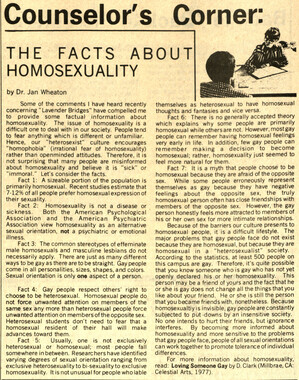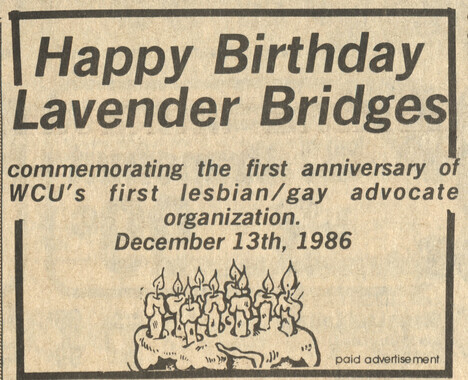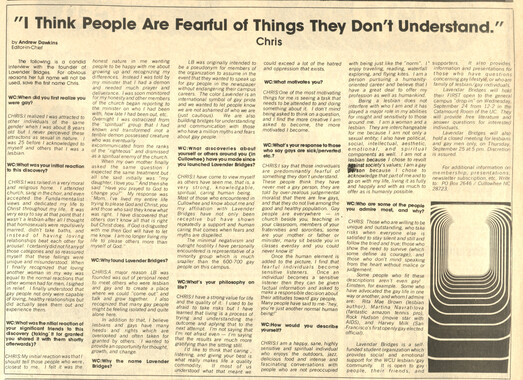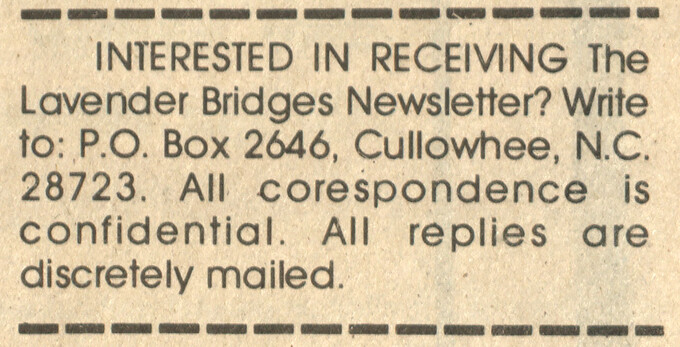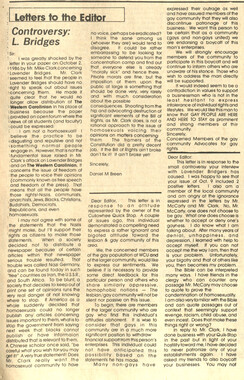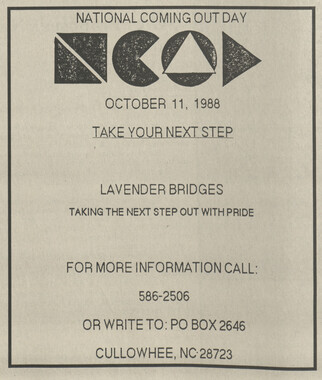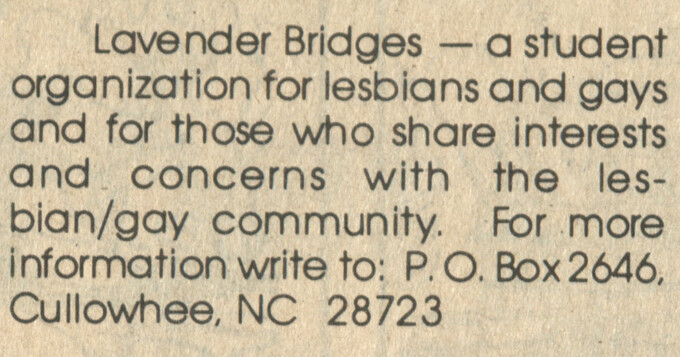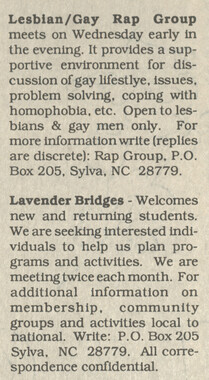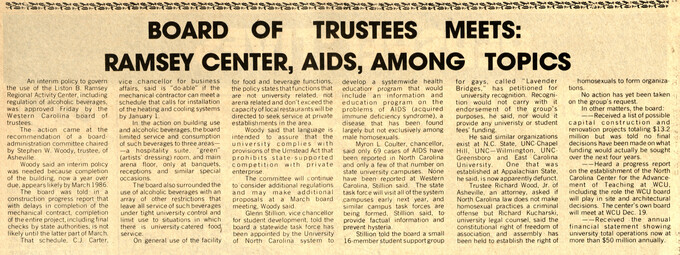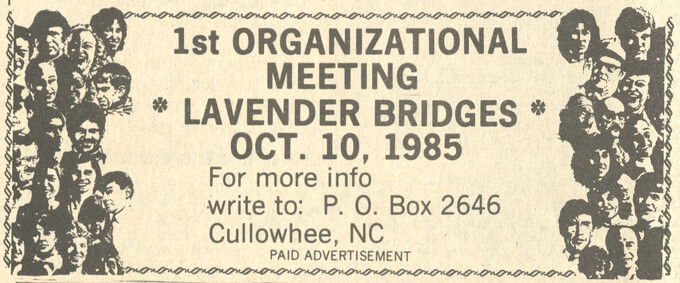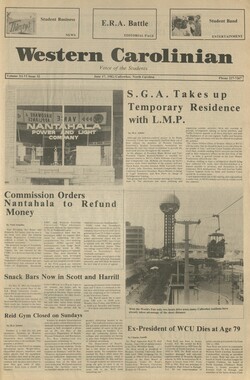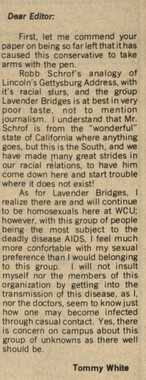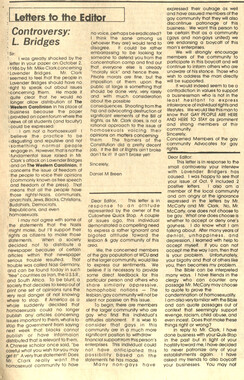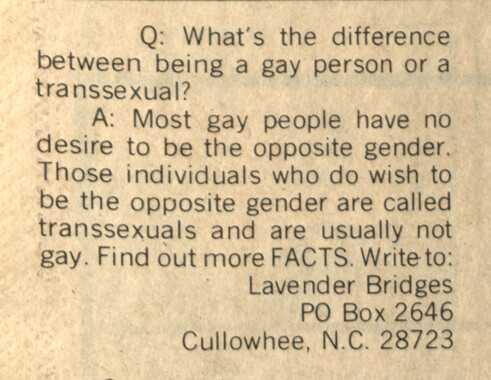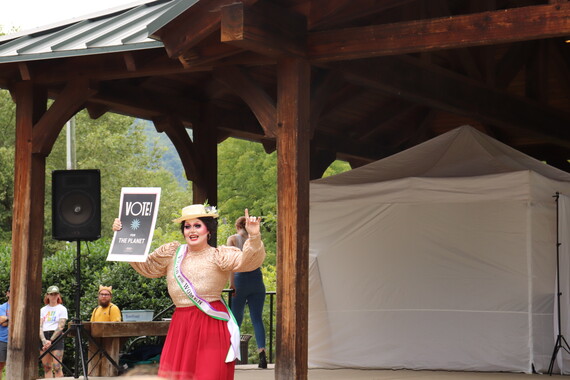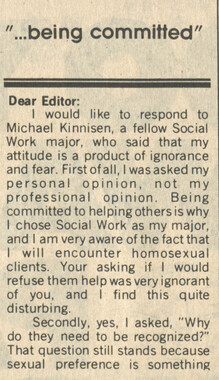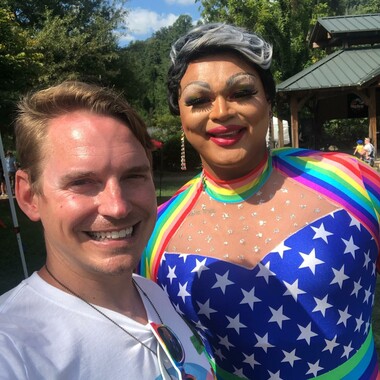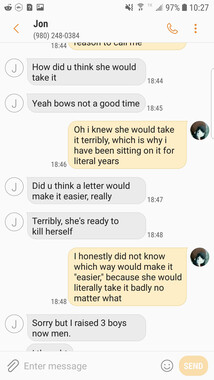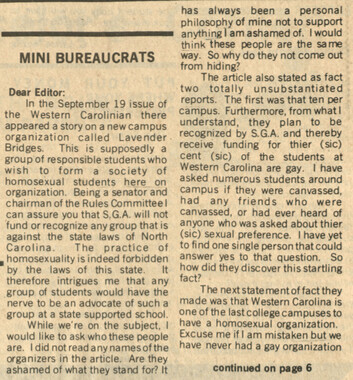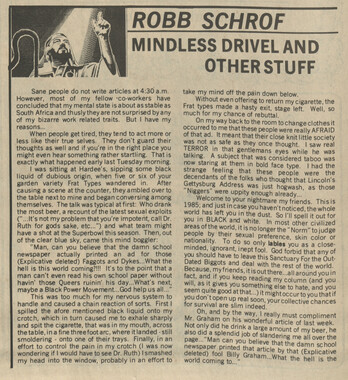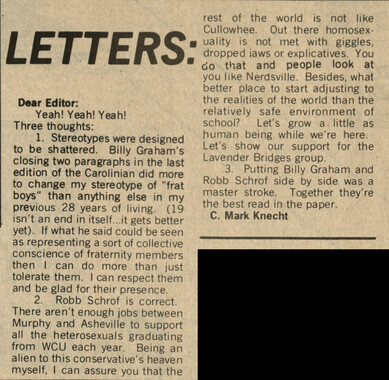Western Carolina University (1)
View all
- LGBTQIA+ Archive of Jackson County (3)
- Canton Champion Fibre Company (0)
- Cherokee Traditions (0)
- Civil War in Southern Appalachia (0)
- Craft Revival (0)
- Great Smoky Mountains - A Park for America (0)
- Highlights from Western Carolina University (0)
- Horace Kephart (0)
- Journeys Through Jackson (0)
- Oral Histories of Western North Carolina (0)
- Picturing Appalachia (0)
- Stories of Mountain Folk (0)
- Travel Western North Carolina (0)
- Western Carolina University Fine Art Museum Vitreograph Collection (0)
- Western Carolina University Herbarium (0)
- Western Carolina University: Making Memories (0)
- Western Carolina University Publications (0)
- Western Carolina University Restricted Electronic Theses and Dissertations (0)
- Western North Carolina Regional Maps (0)
- World War II in Southern Appalachia (0)
University of North Carolina Asheville (0)
View all
- Faces of Asheville (0)
- Forestry in Western North Carolina (0)
- Grove Park Inn Photograph Collection (0)
- Isaiah Rice Photograph Collection (0)
- Morse Family Chimney Rock Park Collection (0)
- Picturing Asheville and Western North Carolina (0)
- 1980s (47)
- 1990s (3)
- 1600s (0)
- 1700s (0)
- 1800s (0)
- 1810s (0)
- 1820s (0)
- 1830s (0)
- 1840s (0)
- 1850s (0)
- 1860s (0)
- 1870s (0)
- 1880s (0)
- 1890s (0)
- 1900s (0)
- 1910s (0)
- 1920s (0)
- 1930s (0)
- 1940s (0)
- 1950s (0)
- 1960s (0)
- 1970s (0)
- 2000s (0)
- 2010s (0)
- 2020s (0)
- Jackson County (N.C.) (50)
- Appalachian Region, Southern (0)
- Asheville (N.C.) (0)
- Avery County (N.C.) (0)
- Blount County (Tenn.) (0)
- Buncombe County (N.C.) (0)
- Cherokee County (N.C.) (0)
- Clay County (N.C.) (0)
- Graham County (N.C.) (0)
- Great Smoky Mountains National Park (N.C. and Tenn.) (0)
- Haywood County (N.C.) (0)
- Henderson County (N.C.) (0)
- Knox County (Tenn.) (0)
- Knoxville (Tenn.) (0)
- Lake Santeetlah (N.C.) (0)
- Macon County (N.C.) (0)
- Madison County (N.C.) (0)
- McDowell County (N.C.) (0)
- Mitchell County (N.C.) (0)
- Polk County (N.C.) (0)
- Qualla Boundary (0)
- Rutherford County (N.C.) (0)
- Swain County (N.C.) (0)
- Transylvania County (N.C.) (0)
- Watauga County (N.C.) (0)
- Waynesville (N.C.) (0)
- Yancey County (N.C.) (0)
- Clippings (information Artifacts) (50)
- Interviews (1)
- Aerial Photographs (0)
- Aerial Views (0)
- Albums (books) (0)
- Articles (0)
- Artifacts (object Genre) (0)
- Bibliographies (0)
- Biography (general Genre) (0)
- Cards (information Artifacts) (0)
- Crafts (art Genres) (0)
- Depictions (visual Works) (0)
- Design Drawings (0)
- Drawings (visual Works) (0)
- Envelopes (0)
- Facsimiles (reproductions) (0)
- Fiction (general Genre) (0)
- Financial Records (0)
- Fliers (printed Matter) (0)
- Glass Plate Negatives (0)
- Guidebooks (0)
- Internegatives (0)
- Land Surveys (0)
- Letters (correspondence) (0)
- Manuscripts (documents) (0)
- Maps (documents) (0)
- Memorandums (0)
- Minutes (administrative Records) (0)
- Negatives (photographs) (0)
- Newsletters (0)
- Newspapers (0)
- Occupation Currency (0)
- Paintings (visual Works) (0)
- Pen And Ink Drawings (0)
- Periodicals (0)
- Personal Narratives (0)
- Photographs (0)
- Plans (maps) (0)
- Poetry (0)
- Portraits (0)
- Postcards (0)
- Programs (documents) (0)
- Publications (documents) (0)
- Questionnaires (0)
- Scrapbooks (0)
- Sheet Music (0)
- Slides (photographs) (0)
- Songs (musical Compositions) (0)
- Sound Recordings (0)
- Specimens (0)
- Speeches (documents) (0)
- Text Messages (0)
- Tintypes (photographs) (0)
- Transcripts (0)
- Video Recordings (physical Artifacts) (0)
- Vitreographs (0)
- College student newspapers and periodicals (49)
- African Americans (0)
- Appalachian Trail (0)
- Artisans (0)
- Cherokee art (0)
- Cherokee artists -- North Carolina (0)
- Cherokee language (0)
- Cherokee pottery (0)
- Cherokee women (0)
- Church buildings (0)
- Civilian Conservation Corps (U.S.) (0)
- Dams (0)
- Dance (0)
- Education (0)
- Floods (0)
- Folk music (0)
- Forced removal, 1813-1903 (0)
- Forest conservation (0)
- Forests and forestry (0)
- Gender nonconformity (0)
- Great Smoky Mountains National Park (N.C. and Tenn.) (0)
- Hunting (0)
- Landscape photography (0)
- Logging (0)
- Maps (0)
- Mines and mineral resources (0)
- North Carolina -- Maps (0)
- Paper industry (0)
- Postcards (0)
- Pottery (0)
- Railroad trains (0)
- Rural electrification -- North Carolina, Western (0)
- School integration -- Southern States (0)
- Segregation -- North Carolina, Western (0)
- Slavery (0)
- Sports (0)
- Storytelling (0)
- Waterfalls -- Great Smoky Mountains (N.C. and Tenn.) (0)
- Weaving -- Appalachian Region, Southern (0)
- Wood-carving -- Appalachian Region, Southern (0)
- World War, 1939-1945 (0)
- StillImage (1)
- Text (49)
- MovingImage (0)
- Sound (0)
Western Carolinian column "Where's Rob Schrof?"
-
In the November 4, 1987 issue of the Western Carolinian, Chris Geis writes a column titled "Where's Rob Schrof?" about the apathy of students at WCU. He reminisces about the days two years ago when the writings of Robb Schrof, Billy Graham, and Carl Brickman could rile up the student body. The students were particularly responsive when the subject of Lavender Bridges came up. Lavender Bridges, an anonymously founded student organization open to all individuals, aimed to promote awareness of lesbian and gay lifestyle, provide lesbian and gay resources, and increase communication with all students and community members. The first organizational meeting took place October 10, 1985 and was officially recognized by the office of Student Development on December 13, 1985. The last mention of the group appeared in the October 10, 1991 issue of the Western Carolinian.
-
-
_By Chris Geis Where's Rob Schrof? My friend Billy — that noted Western Carolinian columnist vacationing somewhere between Sylva and Waynev- ille this semester — has been a pleasant sounding board for me for the last couple of years, preventing me from turning into another effete idealist and intellectual. He constantly comes to the rescue of a young man thirsty for debate and thought-provoking conversation, and he uses real words, too, like constertaneous or panacea. Show me a dozen WCU students who wouldn't need a dictionary for those words. Billy thinks tradition is what this school is lacking, like the tradition they have at that sacred sister institution of ours in Chapel Hill. Paula is another friend of mine who has kept the intellectual in me from withering up and blowing off down N.C. 107. She thinks the emphasis on Greek life at Western — too much reliance on those nice but over-dramatized indulgences, sex and alcohol — has done our student body in, focusing attention away from other areas like academics or cultural events. I certainly want to place the blame for this lethargic student body somewhere, although I think I'll stay away from business majors this week, as much as I'd like to get my hands on that business professor who lambasted liberal arts majors in my friend Tim's class last week. (In the last issue I got my friend Lee, a student at the University of Tennessee, mad because of my disregard for those who choose to study business in college; he is one of them. Really, I have business majors for friends. The editor and business manager of this newspaper — the ones who gave this job and pay me, repsectively — are business majors. Maybe I even love business majors.) But just where to place the blame for this fastidious student body is a difficult task. One would naturally first point to the university's administration, which has admitted about a third of a student body that probably should retake grades 9-12 and the SAT as well. The administration is not all at fault, however, for its hands are tied: Should it liberally give the opportunity for a college education to people who might be able to make something of themsevles (read: take in these marginals' tuition money to better the school), or should it admit only the students whom it knows can handle the academic demands of college life (read: and lose the marginals' money)? There is little choice but for it to admit as many marginal students as it can, for whether or not they bring down the overall quality of the student body (and hence, the school's image to outsiders, for a school is only as good, most say, as its student body), the university needs that money to keep the school from turning into another WCTC, or Western Carolina Teachers' College, which it once was and which some say it still is. Where do I want to place blame? Well, as much as I respect the opinions of Billy and Paula — and I yearn for their observations and conclusions all the time — I have to disagree with them to some extent. We have tradition at Western. The school is almost 100 years old (although, granted, most of those years were as a teachers' college). We have old buildings and old trees and stone-paved sidewalks (take a walk on the lovely hill side of campus one day and you may move up there). And the Greeks take enough heat from the rest of the student body; we can't blame their existence and influence for the problems of our school. I have to point to pride in the university as the culprit. I don't think most of the students at Western take iheir studies. or their time at the school seriously enough. They think it's a big joke. They go home every weekend and watch the Carolina football game on TV, rather than staying here to watch a l-AA football team kick some tail around Bob Waters Field. They sit in their rooms on weeknights and watch "Moonlighting," rather than going to a Catamount basketball game. Their excuse isn't that they have to study — are you kidding? They just don't take anything seriously, not even class. There are plenty of things too take pride in or care about at this unversity. But our students just don't seem to care. The only thing you can be sure to get at least part of the student body fired up about (aside from sex and alcohol) is Lavender Bridges, the gay support group that tried to get student government recognition here a couple of years ago. In fact, Lavender Bridges is the only topic we've ever counted on every year to get feedback on here at The Western Carolinian. Two years ago the campus was up in arms about it. I remember that year, my sophomore year. We had a columnist named Rob Schrof, and each week, with the countenances of Editor Randy Rosenthal, Schrof would get all kinds of people mad with his blunt and inexorable writing style on this page. Next to Schrof's weekly editorial vomittings were those of Graham and another friend of mine, Carl Brickman. What times those were. You couldn't find a copy of The Carolinian around campus the day after it came out. And when it did come out, students' heads volleyed back and forth in tennis-spectating manner as they perused the point-counterpoint-counter-counterpoint writings of that triumvirate of Schrof, Graham and Brickman. Students cared about what Schrof (and Graham and Brickman) wrote - they finally cared about something! I think many students took pride in having a scribe like Schrof, the likes of whom has never been seen on this campus, entertain them each week. Or if they didn't they certainly made it known, which could only mean that they cared about something. How I yearn for those days now. Presently Schrof is somewhere in a Denver suburb, and Graham and I expect to have him drop in soon and milk us for our hospitality and humor, but it just won't be the same. However cloying Schrof or any of his contemporary rivals were to the rest of us, they made us care. That is something not too many of us seem to be able to do at Western these days. I wish I knew of some other way to do it. It would enrich us all a bit, and it'd be a little more fun around here, too.



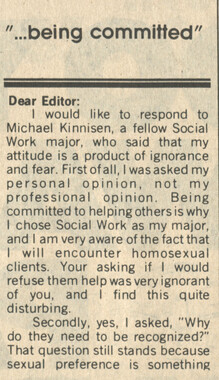


.jpg)
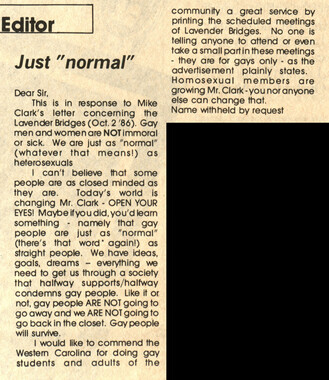
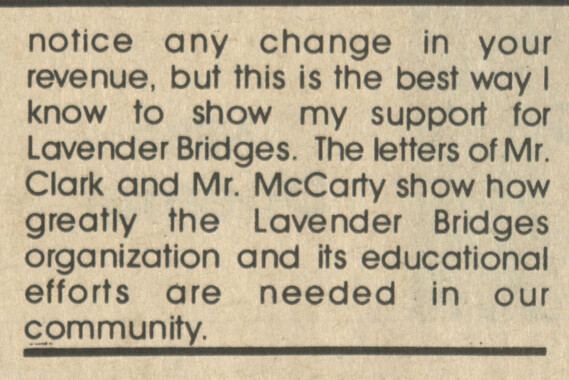

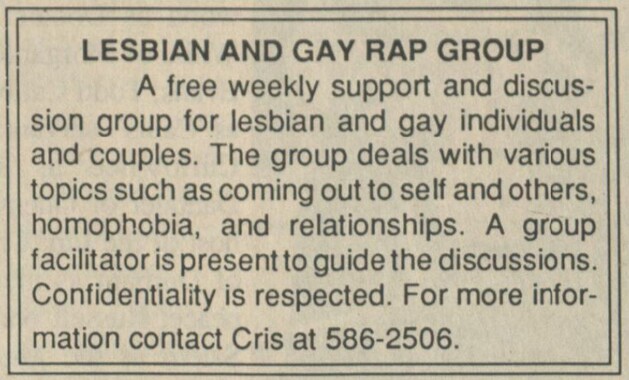



.jpg)


